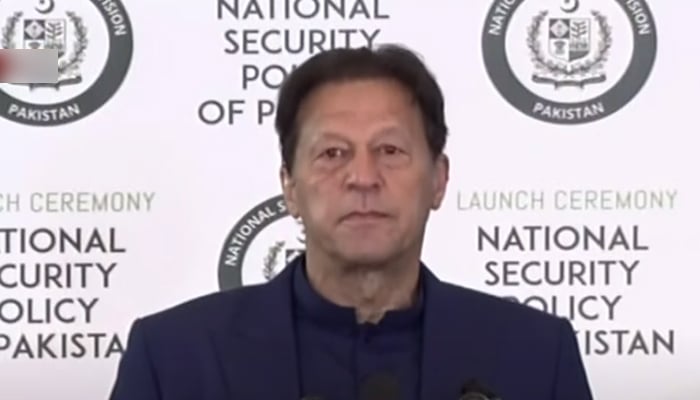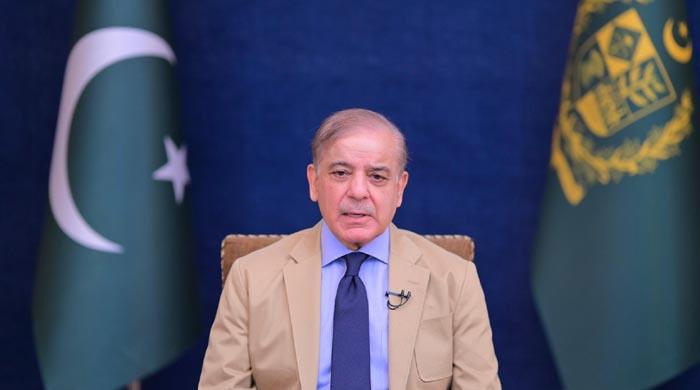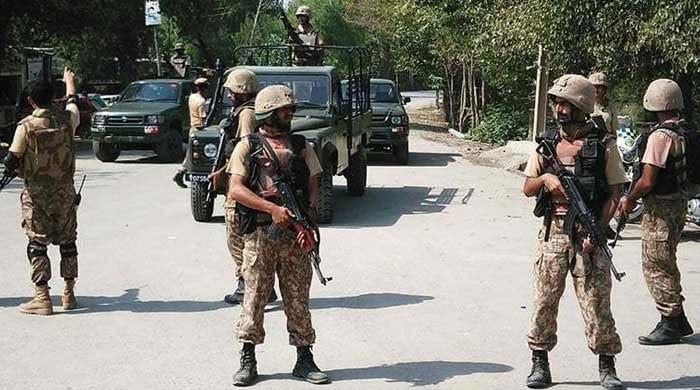'Heading in right direction': PM Imran Khan launches National Security Policy's public version
PM says policy defines nation security in 'right manner';' NSA Mooed Yusuf says policy finalised after full civil-military consensus
January 14, 2022

- PM Imran Khan says national security policy defines security in 'right manner'.
- When people become stakeholders to save country, it is the greatest national security, says premier.
- NSA Moeed Yusuf says policy finalised after complete civil-military consensus.
ISLAMABAD: Prime Minister Imran Khan launched Friday the public version of the country's first-ever National Security Policy 2022-2026, saying the nation is now headed in the right direction.
"The original version of the policy will remain classified, but a public version of the document will be released," according to Radio Pakistan.
The premier, addressing the launch ceremony of the policy, said national security was defined "in the right manner" in the new policy, as Pakistan had a one-dimensional thought: "We only need military security".
The federal cabinet ratified the policy on December 28, 2021, a day after the National Security Committee (NSC) had approved it.
The prime minister said the one-dimensional mindset prevailed in Pakistan as we had "insecurities" due to wars against India in 1948 and 1965.
He also paid tribute to the armed forces and said that despite a persistent threat of terror to the country, the way that Pakistan's security forces fought against terrorism, was commendable.
PM Imran Khan noted that the biggest security of a state is its people. "When the people become stakeholders of the country, it becomes the greatest national security."
Why do we take loans from IMF?
Speaking about the International Monetary Fund (IMF), PM Imran Khan said that a state's security is compromised when it has to intermittently seek the support of the money lender.
"We approach IMF under duress as in the end, only IMF is ready to help us and provide the cheapest loans. We have to abide by their conditions, and as a result, impose burden on the people."
The premier noted that when the country's economy is weak, it weakens its defence. He said no previous government focused on sustainability.
'Complete civil-military consensus'
For his part, National Security Adviser (NSA) Dr Moeed Yusuf said that the NSP has taken a broad view of national security as both traditional and non-traditional issues impacted our security.
"While the National Security Policy is centered around economic security, the geo-strategic and geo-political imperatives also feature prominently to strengthen Pakistan security and standing in the world."
He highlighted that this was a document finalised after complete civil-military consensus.
The NSP
The policy emphasises a geo-economic vision to supplement the focus on geostrategy and highlights that the foremost aim of Pakistan’s foreign policy and military capability was peace and stability in the region and beyond, based on mutual respect and sovereign equality, APP reported.
The formulation process of the policy includes multiple consultations with official stakeholders and input from over 600 individuals, including national security experts, the state-run news agency said.
“Our national security thinking seeks to identify means of expanding economic resources such that Pakistan can simultaneously strengthen its traditional and non-traditional security,” said National Security Adviser to PM Dr Moeed Yusuf, according to APP.
The main themes of the NSP are national cohesion, securing an economic future, defence, and territorial integrity, internal security, foreign policy in a changing world.
The policy is aimed at addressing three critical economic challenges, external imbalance, socio-economic inequalities, and geographic disparities between developed and under-developed regions of Pakistan.
The document emphasises the non-negotiable focus on defence and territorial integrity of Pakistan, strengthening space-based technology and its application, and combating hybrid warfare through enhancing information and cyber security.
Regarding internal security, the policy seeks to ensure writ of the state across the country, zero-tolerance towards terrorism, extremism, and violent sub-nationalisms, and fighting the menace of organizsd crimes.
The NSP will secure Pakistan’s interest and position globally. A just and peaceful resolution of the Jammu and Kashmir dispute in accordance with UNSC resolutions has been declared a vital security interest for the country.
The national security document would provide for pursuing youth-focused policies, guaranteeing food security, improving preventive healthcare, and mainstreaming climate adaptation.












